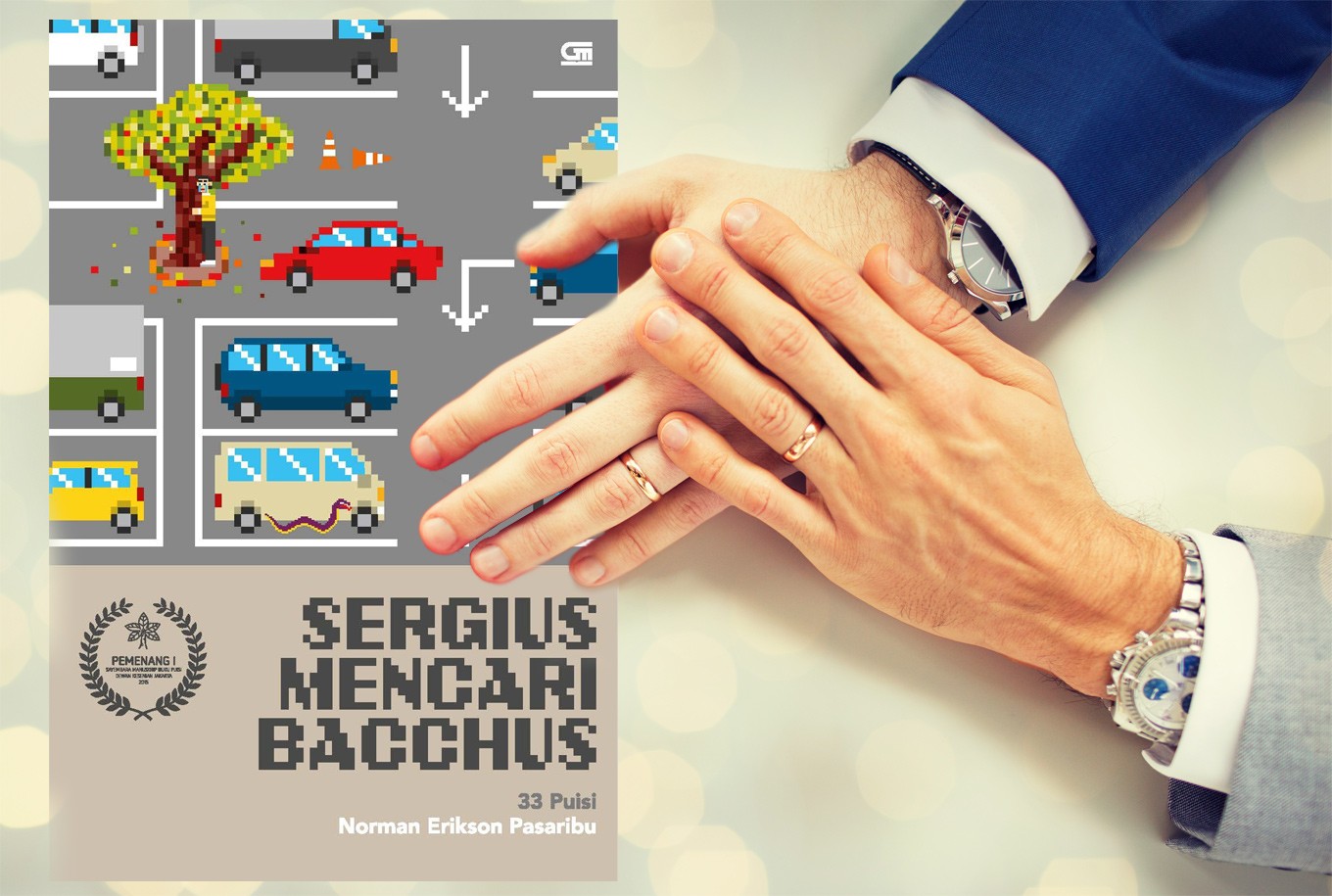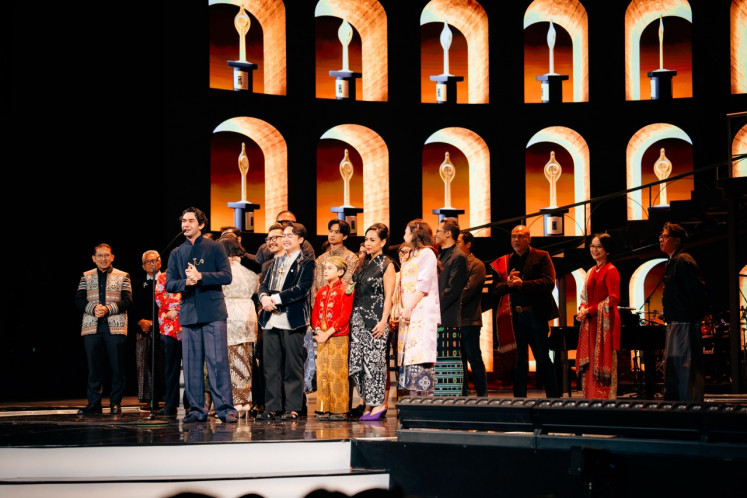Popular Reads
Top Results
Can't find what you're looking for?
View all search resultsPopular Reads
Top Results
Can't find what you're looking for?
View all search resultsDepiction of struggle of Indonesia’s gays in 'Sergius Mencari Bacchus'
For some who are familiar with lesbian, gay, bisexual, and transgender (LGBT) studies, it is quite intriguing to guess what Norman is showcasing in his poems just by reading the title. Sergius and Bacchus are two names that are often referred to by activists as Christian martyrs and saints, whose relationship had a (homosexual) romantic dimension.
Change text size
Gift Premium Articles
to Anyone
L
ast week, Norman Erikson Pasaribu, a young short-story writer and poet from Bekasi, West Java, released a collection of poems entitled "Sergius Mencari Bacchus" (Sergius Searches for Bacchus).
The collection won first prize at the Jakarta Arts Council's Poetry Manuscript Competition held last year, with three prominent names in Indonesian literary scenes as the judges: Oka Rusmini, Joko Pinurbo, and Mikael Johani.
Norman's first collection of short stories, "Hanya Kamu yang Tahu Berapa Lama Lagi Aku harus Menunggu" (Only You Know How Long I should Wait), captivated literature lovers, particularly after it was shortlisted in the 2014 Khatulistiwa Literary Award. Since then, along with two other young writers, Rio Johan and Faisal Oddang, Norman has been regarded as the new young champion of the archipelago's literary scene. While Faisal imbues his literary style with cultural anthropology, Rio and Norman challenge the constructions of ‘normality’, particularly those related to sexuality discourses.
For some who are familiar with lesbian, gay, bisexual, and transgender (LGBT) studies, it is quite intriguing to guess what Norman is showcasing in his poems just by reading the title. Sergius and Bacchus are two names that are often referred to by activists as Christian martyrs and saints, whose relationship had a (homosexual) romantic dimension. As officers in Rome’s Galerius army, they were severely tortured when their ‘secret’ Christianity was exposed to the Romans in the fourth century and they refused to abandon their faith in Christ.
With this background story, it is not difficult to find some poems in Pasaribu’s anthology of 33 poems that deal with homosexuality in Indonesia.
On the back cover of the book, the judges praise Norman's expertise in mixing different references, allusions and styles; ranging from high culture to recent pop culture. On the other hand, his close examinations and depictions of homosexuality are also worth further discussion, since they showcase the struggles of the country's homosexuals.
In some of his poems, Norman depicts the subjectivity and struggles of a gay Indonesian, who is born into a Batak family.
"Puisi" (Poem)
In this poem, the subject recognizes that his life is merely an act; he is the actor and his parents are the only spectators. When the subject lies awake in the middle of the night, thinking of his life that is now only about "bon-bon hotel murahan dan sepat mani di tenggorokan" (the cheap hotel’s receipts and jizz in the throat), he suddenly hears his partner mentioning his name in his sleep (“ia mengigaukan namamu"). He then cries, realizing that his partner really loves him.
One day, when he listens to his wife singing in the kitchen, he finally decides to tell her about what has happened in the dark ("menceritakan yang habis dalam gelap") and show her about what has been left ("menunjukkan apa yang tersisa").
This first poem depicts how Indonesian homosexuals who are forced to get married heterosexually struggle with their own happiness. The life, as Norman depicts it in this poem, is like a tree that is encroached by benalu (parasites) he has been nurturing. The parasite symbolizes the homosexual desires that should be repressed publicly, but surreptitiously nurtured by the subject.
"Erratum"
However, coming out and embracing homosexual identity has hard consequences.
In this poem, the male subject is born into a Batak family. After publishing his first book, one day at dinner he tells his family that he will not end up marrying a Toba or Karo girl.
His father disowns him and warns him, “Don’t come back again, faggot!” ("Jangan kembali lagi, Banci!"). He then thinks of his life metaphorically as a text, in which the publisher can amend the oddities of his life using “a piece of correction paper” ("secarik kertas koreksi").
Cultural traditions and current religious teachings are still major impediments for Indonesian homosexuals embracing their desires and identity. In some traditions, sons are still considered important in families, because they are the carrier of the marga (family name).
Seeing the impossibility of reconciling his sexuality and cultural-family traditions, the subject in "Erratum" reflects that his first love came from his family when he was born as a son.
"Curriculum Vitae"
Similar nuances can also be found in this poem, wherein the male subject experiences marginalization from childhood. Some parents of kids living near his residence warn their kids to not play with him just because he is a Batak and Christian. On the other hand, his father used to beat him, mindful of his effeminacy, and even calls him banci (faggot) in front of people.
Not so long after he finishes his undergraduate study, he simply recognizes that the Batak people around his family call him this derogatory term. At age 22, he is depressed and runs away from home, only to find Herta Muller’s books that help liberate him. He then meets his male lover in a writing class and they dream of living together and having a kid who might be named Langit (Sky).
"Tentang Sepasang Lelaki Muda di Basemen P3 fX Sudirman" (About a young male couple in P3 Basement of the fX Sudirman)
In gay history, urban spaces—like parks, clubs, bars—have significant roles in the emergence of contemporary gay identity and sociability. However, these spaces are not always easily accessible for homosexuals to express their relationships.
In this poem, inside a Terios car in the corner of a shopping mall's basement, a young male couple spends time together, while keeping a watch on their surroundings in case a security guard or cleaner might spot them. This poem shows the contestation of public space for gay Indonesians.
Unfortunately, urban spaces, alongside their individualistic characteristics, do not always provide freedom to everyone. In a shopping mall, for example, as portrayed in this poem, a gay couple could only surreptitiously express their love.
Heteronormative culture has perpetuated the normalization of hegemonic heterosexuality that dominates public spaces. Lauren Berlant and Michael Warner argue that heteronormativity is publicly mediated through legal, popular and political discourse to ensure the continuation of hegemonic national heterosexuality.
In short, it is OK if heterosexual couples express their intimacy in public spaces, but this privilege does not apply to same-sex couples; they have to hide the expression of their sexuality. It thus poses a question as to how the notion of ‘intimacy’ in public spaces cannot be separated from hegemonic heterosexuality.
The notion of ‘privacy’ for gay Indonesians in the heteronormative culture is also entangled with class, wherein this poem the couple can afford a car in which to spend their time together. It thus poses the question of how the notions of “intimacy” and “privacy” in public space cannot be separated from hegemonic heterosexuality and class structure.
"Aubade"
It has been known that global or Western gay discourses influence the subjectivity of gay Indonesians.
In this poem, Norman depicts a group of gay people who hang out in McDonald's at 5 a.m. They have just watched "Prayers of Bobby"—a film based on true story about Bobby Griffith who committed suicide in 1983 because of his mother’s religious homophobia. Their longing for acceptance of their sexual identity is manifested in their hope to move to the Netherlands, where being gay is not an issue.
However, despite their sexuality, they would not commit suicide, “Bobby has represented you all” ("Bobby telah mewakili kalian semua"). This shows how the Western gay popular culture has a tremendous impact on gay Indonesians to mitigate their fears and to understand about their own sexual identities that, in the local context, is not even recognized.
Furthermore, the fast food restaurant here signifies the irony of neoliberalism. At the surface level, this dominant economic and political regime seems to provide fertile ground for gay liberation. Nevertheless, as illustrated in this poem, despite their exposure to Western popular culture, the gay subjects here are still struggling for family acceptance. The pseudo-/neo- liberalization here inevitably cannot liberate the subjects from their gripping cultural norms.
"Keindahan Hidup" (The Beauty of Life)
An imaginary liberation can be found in this poem, wherein a new mayor is creating an imaginary park in the middle of the town.
In addition to a beautiful landscape, the park formally employs male-to-female waria (transgender) as gardeners, cleaners, security, managers, accountants, landscape designer, veterinarian and other occupations. They do not suffer from hunger and poverty anymore, nor need to wait for cars coming as in Taman Lawang, which is famous as a place of waria prostitution.
*
The private is always political, so is imagination.
Imagination is essential for the social changes and freedom of thought—it embraces the whole range of possibilities, even something that people would never think of. Without imagination, invention and progress would not be possible. Through his newly published collection of poetry, Norman showcases the power of imagination for LGBT Indonesians to reclaim their space in society.
***
The writer, who obtained his Master’s in public policy from the National University of Singapore, is the writer of Coming Out and a lecturer of gender and sexuality studies.
---------------
We are looking for information, opinions, and in-depth analysis from experts or scholars in a variety of fields. We choose articles based on facts or opinions about general news, as well as quality analysis and commentary about Indonesia or international events. Send your piece to community@jakpost.com.











